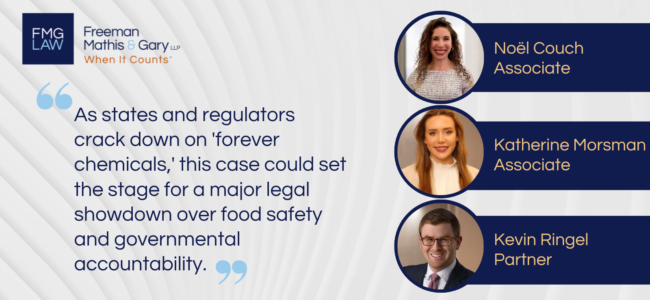BlogLine
Forever chemicals in food: When will the FDA act on PFAS?
3/20/25

By: Noël Couch, Katherine E. Morsman, and Kevin M. Ringel
For over a year, the Food and Drug Administration (FDA) has remained silent on a request to set enforceable limits on per- and polyfluoroalkyl substances (“PFAS”) in food. Now, an environmental group and its co-plaintiffs are taking the agency to court. Their lawsuit alleges that the FDA’s delay in responding to their petition violates federal law and puts public health at risk. As states and regulators crack down on “forever chemicals,” this case could set the stage for a major legal showdown over food safety and governmental accountability.
On Jan. 24, 2025, the Tucson Environmental Justice Task Force and its co-plaintiffs filed a complaint against the FDA for its failure to respond to Tucson Environmental’s request for “tolerance-setting for [PFAS] in or on certain foods” (the “Petition”). Tucson Environmental Justice Task Force v. U.S. Food and Drug Administration, Case 4:25-cv-000035-JAS, p. 2.
The request, included in plaintiffs’ November 2023 petition, asked the FDA to set tolerances for 26 types of PFAS detected in lettuce, blueberries, ready-to-eat bread, milk, eggs, salmon, clams, corn silage, and corn snaplage. The petition further requests the FDA establish temporary tolerances, rather than action levels, for PFAS. Tolerances must be enforced, while action levels are not legally binding.
The plaintiffs allege that the defendants violated the Administrative Procedure Act (“APA”) and the Federal Food Drug and Cosmetic Act (“FFDCA”) by unreasonably delaying the FDA’s response to the petition. Under FDA regulations, the FDA is required to respond to petitions within 180 days. Tucson Environmental filed the petition in November 2023, more than 400 days ago. The plaintiffs allege that the delay is arbitrary and capricious, and seek to force the FDA to make a final decision on the petition.
In the Complaint, the plaintiffs state that the FFDCPA requires the FDA to ensure that “‘foods are safe’ in order to ‘protect the public health.’” Case 4:25-cv-000035-JAS, p. 5 (citing 21 U.S.C. § 393(b)(2)(A), § 346). To do so, the FDA is required to “‘promulgate regulations limiting the quantity of ‘any poisonous or deleterious substance added to any food.’” Case 4:25-cv-000035-JAS, p. 5–6 (citing 21 U.S.C. § 346). The plaintiffs cite the United States Supreme Court’s recent overturning of Chevron deference in support of their assertion that the only discretion the FDA may exercise in promulgating regulations that set tolerances for harmful substances in foods is the level of the tolerance.
While the FDA has taken steps to address PFAS, particularly in food packaging, this case represents an effort by plaintiffs to compel the agency to establish limits on PFAS in food. More broadly, the litigation reflects a growing wave of lawsuits and legislative initiatives aimed at both increasing regulations on PFAS use and pursuing enforcement actions against those who utilize these chemicals.
For more information, please contact Katherine E. Morsman (katherine.morsman@fmglaw.com), Noël Couch (noel.couch@fmglaw.com), or Kevin M. Ringel (kevin.ringel@fmglaw.com) or members of the FMG PFAS Litigation Team and Mass Tort Litigation teams.
Share
Save Print
